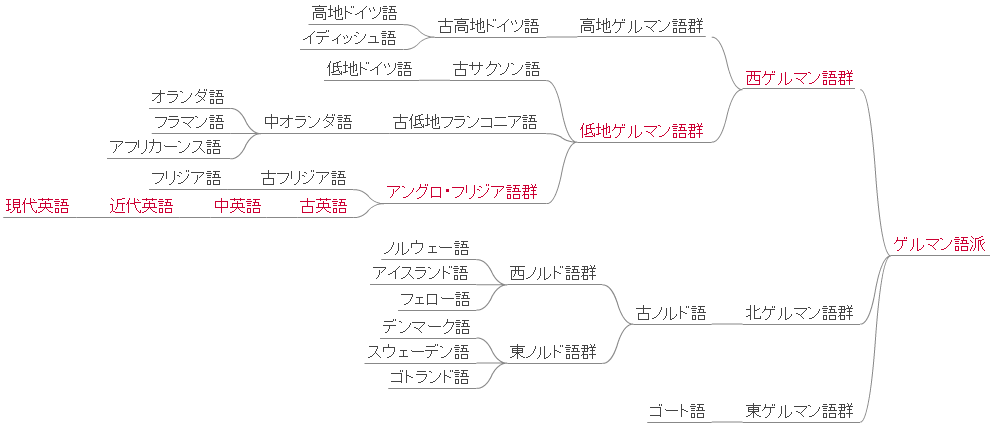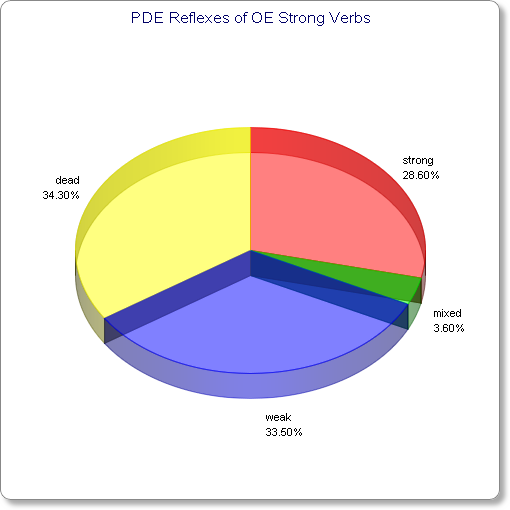ゲルマン語派とゲルマン諸民族

紀元449年,ゲルマン民族の大移動の一環として,西ゲルマン語群に属するアングル人,サクソン人,ジュート人がブリテン島に渡来しました.彼らの母語こそが英語であり,この時期をもって英語の歴史も本格的に始動します.イングランドを築いた彼らは,ゲルマン的なアングロサクソン文化を開花させますが,その文化を支えた「古英語」はいまだゲルマン的色彩の濃い言語的特徴を保っていました.今回も本シリーズの趣旨に沿い,現代まで受け継がれてきた古英語の豊かな語彙的遺産を中心に鑑賞していきましょう.
| 前55–54年 | ユリウス・カエサルのブリタニア遠征 |
| 43年 | ローマ皇帝クラウディウスのブリタニア侵攻 |
| 61年 | イケニ族の女王ボウディッカの反乱 |
| 122–132年 | ハドリアヌスの長城の建造 |
| 140年頃 | アントニヌスの長城の建造(しかし,60年後に放棄) |
| 2世紀末 | ロンドンが中心都市として発達し,街道も整備される |
| 306年 | ブリタニアで即位したコンスタンティヌス,帝国の再編へ |
| 4世紀半ば | キリスト教の伝来,ヨークとロンドンに司教座 |
| 406年 | 大陸のゲルマン諸部族,ライン川を超えてガリアへ侵入 |
| 410年 | ローマ,ブリタニアから撤退 |
| 5–6世紀 | 西ゲルマン語群の諸民族,ブリテン島へ段階的に移住・定住 |
| 449年 | アングロ・サクソンの渡来の伝統的な年代 |
| 461年 | 聖パトリックのアイルランド布教 |
| 563年 | コルンバ,アイオナに修道院創設 |
| 6世紀末 | 7王国の成立 |
| 597年 | 聖アウグスティヌス,キリスト教宣教のために教皇グレゴリウス1世によってローマからケント王国へ派遣される |
| 664年 | ウィットビーの宗教会議でローマキリスト教の優位が認められる |

| 古英語 | 現代英語 | |
|---|---|---|
| 語彙 | 30,000 | 615,100? |
| 本来語比率 (%) | 97 | 30 |

| kenning | 文字通りの意味 | 比喩的意味 |
|---|---|---|
| bāncofa | “bone-chamber” | body |
| bānfæt | “bone-container” | body |
| bānhūs | “bone-house” | body |
| bānloca | “locked bone-enclosure” | body |
| beaduleoma | “battle-light” | sword |
| brēosthord | “breast-hoard” | feeling, thought, character |
| famigheals flota | “foamy-necked floater” | ship |
| feorhhus | “soul-house” | body |
| frumgār | “first spear” | chieftain |
| goldgiefa | “gold-giver” | prince, lord |
| hēafodgimm | “head-gem” | eye |
| hronrād | “whale-road” | sea |
| merehengest | “sea-horse” | ship |
| merestrǣt | “sea-street” | the way over the sea |
| nihthelm | “night-helmet” | cover of night |
| sāwoldrēor | “soul-blood” | life-blood |
| sǣwudu | “sea-wood” | ship |
| sundwudu | “sea-wood” | ship |
| swanrād | “swan-road” | sea |
| sweordplega | “swordplay” | fighting |
| wælstōwe | “place of slaughter” | battlefield |
| wordhord | “word-hoard” | capacity for speech |
| woruldcandel | “world-candle” | sun |
此處に whale-road といふ言葉でありますが,吾々の國には枕詞といふものがあつて,例へば「あしびきの山鳥」「たらちねの父母」といふ様に申します.丁度此の枕詞が之に似て居ります.「たらちねの父母」といふ言葉の代りに,お終ひには「たらちね」だけですませ,枕詞の中に父母という意味がある様になつて來ました.それから「いさなとり」,是は海の枕言葉でありますが,「いさな」とは鯨のことらしい,whale-road と「いさなとり」といふ枕詞と大變似て居ります.吾々の國の文學でさういふ枕詞を使つた時代は平安朝で一應お終ひになりました.平安朝といふ非常に爛熟した時代でお終ひになりましたが,文化の爛熟といふことと修飾した言葉を無暗に使つて喜ぶことと関係があるのではないかと思ひます.でセルマの歌なんか頗る感情的な,形容詞的な歌でありますが,實質的なことをいはないで無暗に形容詞でもつて人の心を掻き立てる様な演説がある時代が現はれると,其の國はそろそろお終ひだと思つて良いかも知れない.文學に使はれる言葉とその國の文化との關係といふものは一つの注意すべき問題であると思ふのであります.(福原,p. 70)
Anno 449. Hēr Martiānus and Valentīnus onfēngon rice, and rīcsodon seofon winter. And on hiera dagum Hengest and Horsa, fram Wyrtgeorne gelaþode, Bretta cyninge, gesōton Bretene on þǣm stede þe is genemned Ypwinesflēot, ǣrest Brettum tō fultume, ac hīe eft on hīe fuhton. Se cyning hēt hīe feohtan ongēan Peohtas; and hīe swā dydon, and sīge hæfdon swā hwǣr swā hīe cōmon. Hīe þā sendon tō Angle, and hēton him sendan māran fultum. Þā sendon hīe him māran fultum. Þā cōmon þā menn of þrim mǣgþum Germānie: of Ealdseaxum, of Englum, of Iotum.
Anno 449. In this year [lit. here] Martianus and Valentinus succeeded to [lit. received] kingship, and ruled seven years. And in their days Hengest and Horsa, invited by Vortigern, king of [the] Britons, came to Britain at the place which is called Ebbsfeet, first as a help to [the] Britons, but they afterwards fought against them. The king commanded them to fight against [the] Picts; and they did so, and had victory wherever they came. Then they sent to Angeln, and told them to send more help. They then sent to them more help. Then the men came from three tribes in Germany: from [the] Old Saxons, from [the] Angles, from [the] Jutes.
(#3317)